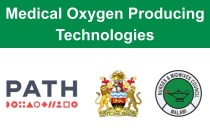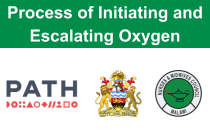Cardiology Important Concepts
Dr. Juli Reynolds PhD
Neo Consult Congenital heart disease (CHD) is the most common congenital disorder in newborns. Critical CHD, defined as requiring surgery or catheter-based intervention in the first year of life, occurs in approximately 25 percent of those with CHD. Although many newborns with critical CHD are symptomatic and identified soon af....
Hypertensive Disorders of Pregnancy
Dr. Juli Reynolds PhD
Neo Consult This course is designed to offer postgraduate education to resident obstetricians, midwives, and nurses working in ante-and postnatal wards as well as in the delivery room. It will support you to change and develop your ways of thinking, inspiring you to become an independent learner who thinks creatively to solv....
Routine Care of Normal Newborn Infants
Dr. Juli Reynolds PhD
Neo Consult After birth, most full term infants (gestational age >39 weeks) and early term infants (GA 37 0/7 to 38 6/7 weeks) require normal neonatal routine care to make a successful transition to extrauterine life. Depending on hospital policy, late preterm infants (GA 34 0/7 to 36 6/7 weeks) who are >35 weeks and well appea....
Initial Assessment of the Newborn
Dr. Juli Reynolds PhD
Neo Consult This course aims to provide midwifes and nurses with the foundation of knowledge required, first, to complete the initial health assessment and examination of the newborn baby and second, to recognise and/or pre-empt those conditions that may adversely affect neonatal well-being. After the infant is born, your in....
Skin Care - Premature Infant
Dr. Juli Reynolds PhD
Neo Consult This course is developed for nurses who care for critically ill infants in the Neonatal Intensive Care Unit. Topics covered: 1. Sin Characteristics of Extreme Premature Infants. 2. SKin anatomy and physiology. 3. Skin Care.
Apnoea of Prematurity
Dr. Juli Reynolds PhD
Neo Consult This course has been developed for nurses working in the Neonatal Intensive Care Unit. The course will enable you to develop your performance in practice, theorise practice and develop the knowledge and skills required to be competent in the role of a neonatal intensive care nurse. 1. Neonatal Residence. 2. Neon....
Skills Assessment First Antenatal Visit
Dr. Juli Reynolds PhD
Neo Consult This course is designed for midwifes and nurses working in antenatal wards. The session includes: Skills assessment guidelines when taking history from a pregnant woman. Skills Assessment Tools.
Persistent Pulmonary Hypertension Of The Newborn (PPHN)
Dr. Juli Reynolds PhD
Neo Consult This course has been developed for nurses working in the Neonatal Intensive Care Unit. The course will enable you to develop your performance in practice, theorise practice and develop the knowledge and skills required to be competent in the role of a neonatal intensive care nurse. Target Audience: 1) Neonata....
Airway and Ventilation
Dr. Juli Reynolds PhD,
Neo Consult The aim of this course is to be a practical guide for medical and nursing staff who are involved in looking after sick children. This presentation covers airway and ventilation in the PICU. Target Audience: PICU Nurses Junior Paediatric Residents
Oxygen Therapy
Dr. Juli Reynolds PhD
Neo Consult This course has been developed for nurses working in the Neonatal Intensive Care Unit. The course will enable you to develop your performance in practice, theorise practice and develop the knowledge and skills required to be competent in the role of a neonatal intensive care nurse. Target Audience: - Neonatal....
Blood Glucose Monitoring
Dr. Juli Reynolds PhD
Neo Consult This course has been developed for nurses working in the Neonatal Intensive Care Unit. The course will enable you to develop your performance in practice, theorise practice and develop the knowledge and skills required to be competent in the role of a neonatal intensive care nurse. Target Audience: 1) Neonata....
Basic Principles of PICU
Dr. Juli Reynolds PhD,
Neo Consult The aim of this course is to be a practical guide for medical and nursing staff who are involved in looking after sick children. This course covers the relevant differences between neonates and adults. Target Audience: PICU Nurses & Junior Paediatric Residents
Chronic Lung Disease in Neonates
Dr. Juli Reynolds PhD
Neo Consult This course has been developed for nurses working in the Neonatal Intensive Care Unit. The course will enable you to develop your performance in practice, theorise practice and develop the knowledge and skills required to be competent in the role of a neonatal intensive care nurse. Target Audience: Neonatal Inte....
Meningocele
Dr. Juli Reynolds PhD
This course has been developed for nurses working in the Neonatal Intensive Care Unit. The course will enable you to develop your performance in practice, theorise practice and develop the knowledge and skills required to be competent in the role of a neonatal intensive care nurse. Target Audience: - Neonatal Intensive Care....
Care of Low-Birth-Weight Infants
Dr. Juli Reynolds PhD
This course provides the advanced knowledge and skills required to care of the low birth weight infant. The course introduces the concept of developmentally supportive care and promotes positive neuro-behavioural outcomes.
Management of Hypoglycemia in Neonates
Dr. Juli Reynolds PhD
Neo Consult Evidence-based nursing is widely recognised as the critical foundation for quality care. This evidence-based practice course is a step toward standardisation of treatment for neonatal hypoglycemia through the following steps: a) Identification of infants at risk. b) Assessment of blood glucose. c) Stabilising blo....
Pediatric Healthcare - Upper respiratory tract conditions
Dr. Juli Reynolds
This course provides a general introduction to respiratory infections in children and basic hygiene measures to protect against infection. By the end of the course, you should be able to describe basic information about upper respiratory infections including what they are, how they are transmitted, how to assess the risk of infe....
Pediatric Healthcare - History and Examination
Dr. Juli Reynolds
This course addresses common and important clinical problems in children. This course covers the following areas. The first meeting and history taking when examining a child. Physical examination of a child. Special investigations and writing clinical notes.
Nutritional Management of the Preterm Infant
Dr. Juli Reynolds
This is an advanced course in nutritional management of the newborn and covers the following topics: 1. Parenteral Nutrition 2. Enteral Feeding 3. The use of human milk in NICU 4. The use of human milk fortifier in NICU 5. Successful Breast Feeding
Infection Control Handbook for NICU
Dr. Juli Reynolds
By the end of this course, you will have learnt about the Infection Control for Nicu.
Rational Use of Medicines and the Role of Nurses
The Empower Group https://www.empowerschoolofhealth.org/
By the end of this course, you will have learnt about the following subjects: Rational Use of Medicines and the Role of Nurses
Good Storage Practices
The Empower Group https://www.empowerschoolofhealth.org/
By the end of this course, you will have learnt about the following subjects: Good Storage Practices
SESSION 8: Heat-Related Illness
Michelle DePhillips, Karen Duderstadt and Gina Friel
This presentation discusses the health impacts of heat-related illnesses, including heat stroke. It will identify vulnerable populations, preventive measures, and best practices for managing heat-related illnesses in clinical settings.
Medical Oxygen Producing Technologies
Norman Lufesi, Raphael Kayambankadzanja, Happy Banda, Jonathan Mhango, Eneli Kaliphee
This session provides the learners with all details regarding Medical Oxygen production processes, how different oxygen producing devices function, the required oxygen concentration/purity to be delivered to a patient and the safety precaution to be followed when delivering medical oxygen.
Process of Initiating and Escalating Oxygen
Norman Lufesi, Raphael Kayambankadzanja, Happy Banda, Jonathan Mhango, Eneli Kaliphee
By the end of this course, you will have learnt about Process of Initiating and Escalating Oxygen





















